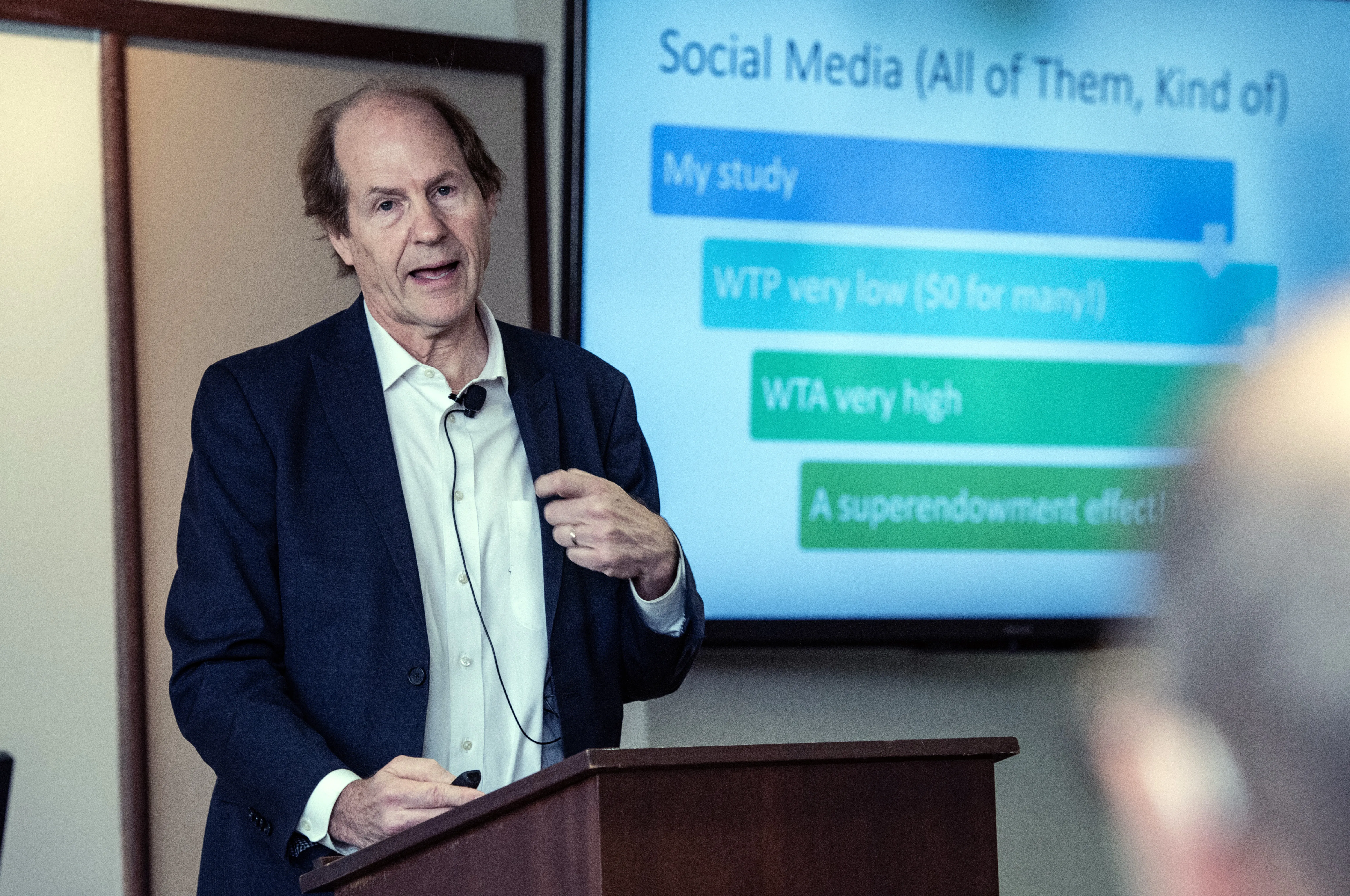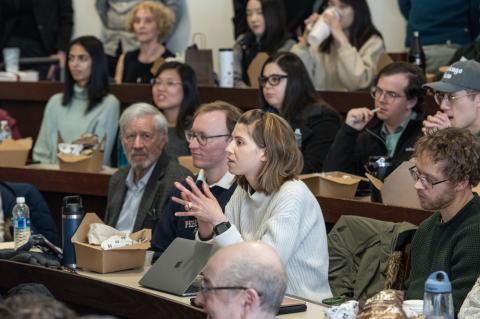Professor Cass R. Sunstein Presents 2025 Dewey Lecture, “Goods That People Buy but Wish Did Not Exist”

In society today, more and more people are paying for goods and services that they do not enjoy, and that in fact, may cause harm to their wellbeing. From high heels to neckties to social media, people are spending a great deal of their time and money on things that to some degree they wish did not exist. What drives this behavior? And what can we do to stop it?
These were the central questions that Harvard Law Professor Cass Sunstein explored in his hour-long talk at the Law School’s 2025 Dewey Lecture in Law and Philosophy on January 15. Sunstein’s visit represented somewhat of a homecoming; he was a UChicago professor of law and political science in the 1980s through the 2000s. “It’s a complete thrill and honor to be at home,” he said at the start of his talk.
A highly influential scholar on topics that range from constitutional law to behavioral economics, Sunstein is renowned for his mastery of the interdisciplinary study of law—which is precisely what the Dewey Lecture was established in 1981 to highlight.
Named in honor of American philosopher and educator John Dewey, the lecture was created with an endowment from the John Dewey Foundation.
“Dewey’s connections to the University are deep and multifaceted,” noted Dean Thomas J. Miles in his introductory remarks. “[He] was the chair of our Philosophy Department and during that time was a leading philosopher of pragmatism, which was an intellectual movement that applied scientific methods to social problems.”
Analyzing Social Media as a “Barbie”
The central claim behind Sunstein’s talk was that certain goods we “buy,” either by spending our money or time on them, do not enrich our lives, but instead create an intrusion on our ability to create the life we actually desire. This, in turn, affects our wellbeing. Sunstein called goods that have the effect “Barbies,” after the iconic fashion doll, which he said is an exemplar of a pervasive thing many buy but wish did not exist.
To illustrate the concept of a “Barbie,” Sunstein focused on social media as an example, sharing the results of three studies that analyzed user engagement and attitudes toward various social media apps.
The results were “puzzling,” he said.
The first study was his own. In a large-scale nationally representative study, he asked how much people would be willing to pay, on a voluntary basis, to use social media platforms and how much they would be willing to accept to pay, say, if it were required, to use those same platforms. The findings revealed that Americans would pay very little—$5 on average—for most platforms, but in contrast, the willingness to accept was on average $50 to $100.
“Typically, the ratio between willingness to pay and willingness to accept is one to two,” said Sunstein. “Here, the ratio is one to twenty. I’m aware of no other area in which the endowment effect is that big.”
Sunstein hypothesized that people gave a low “willing to pay” number because, simply, they felt angry at the thought of having to pay for something that they previously enjoyed for free. As to why the “willingness to accept” was so high, Sunstein concluded that the reason is not clear. “I think we would have to say that neither measure is a reliable welfare measure,” he said.
The two other studies Sunstein shared involved similar questions that produced very similar results. The first, by Hunt Allcott and collaborators, involved Facebook and measuring the effects of wellbeing on people who were willing to a receive payment in exchange for staying off the platform for one month. The people who unplugged reported higher rates of wellbeing and overall satisfaction with their lives, but once again there was a puzzling finding. People demanded a much higher amount than expected to continue staying off the platform past the initial month, even though their lives had evidently improved without it.
“That’s a staggering resolve,” said Sunstein. “Is there something in social media usage—Facebook in this case—that provides a benefit that isn’t about life satisfaction? It might be about knowledge, it might be about connection, or perhaps something else. The paper doesn’t tell you the answer.”
The Structure of the Problem
Sunstein posited that the issue has to do with the nature of the problem itself. The reason people aren’t so easily plied away from goods that they buy but don’t enjoy has to do with the lack of a third option to buying or not buying—and that is, the good not existing in the first place.
The findings from the third study that Sunstein shared proved this point. The study, conducted by Leonardo Bursztyn and collaborators, investigated how much college students were willing to pay to use Instagram and TikTok and how much they would demand to give up using the platforms. It also asked how much they would demand to get off the platforms contingent upon everyone else in their lives also getting off the platforms.
Interestingly, a large sample of college students were willing to pay a whole lot to stay off the platform if it meant that everyone else they knew would also disengage.
“It’s about solving a coordination problem,” said Sunstein. “It’s similar to people not being willing to pay very much to protect the environment, for example, unless they know that everyone else will be paying a lot to protect it.”
Potential Solutions
At the end of his talk, Sunstein suggested that it’s up to consumers to establish a norm of some kind that creates a better welfare environment for everyone. “I almost wore a tie to this talk, but then someone in this audience informed me that no one wears a tie anymore,” he said, soliciting laughter.
Ultimately, people should seek to engage in voluntary actions that help people feel less pressured to buy “Barbies.” But sometimes, he noted, occasions for legal interventions are warranted. The White House, for example, emphasized a few months ago that Americans should not be subject to confusing, manipulative, or deceptive practices online, such as hidden fees.
“This is a new frontier for theory and practice,” said Sunstein. “The broader idea here is a right to not be manipulated. It’s an idea that is fundamental to freedom and welfare under contemporary conditions.”
